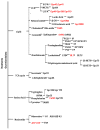Metabolite G-Protein Coupled Receptors in Cardio-Metabolic Diseases
- PMID: 34943862
- PMCID: PMC8699532
- DOI: 10.3390/cells10123347
Metabolite G-Protein Coupled Receptors in Cardio-Metabolic Diseases
Abstract
G protein-coupled receptors (GPCRs) have originally been described as a family of receptors activated by hormones, neurotransmitters, and other mediators. However, in recent years GPCRs have shown to bind endogenous metabolites, which serve functions other than as signaling mediators. These receptors respond to fatty acids, mono- and disaccharides, amino acids, or various intermediates and products of metabolism, including ketone bodies, lactate, succinate, or bile acids. Given that many of these metabolic processes are dysregulated under pathological conditions, including diabetes, dyslipidemia, and obesity, receptors of endogenous metabolites have also been recognized as potential drug targets to prevent and/or treat metabolic and cardiovascular diseases. This review describes G protein-coupled receptors activated by endogenous metabolites and summarizes their physiological, pathophysiological, and potential pharmacological roles.
Keywords: GPCR; cardiovascular; inflammation; metabolic syndrome; metabolites.
Conflict of interest statement
Not applicable.
Figures
References
Publication types
MeSH terms
Substances
Grants and funding
LinkOut - more resources
Full Text Sources
Medical


